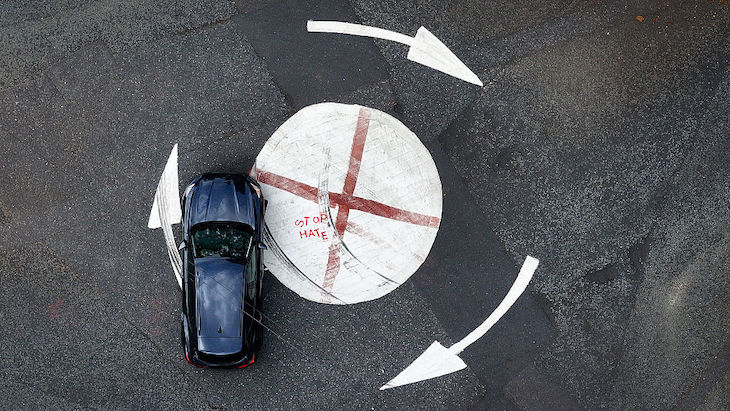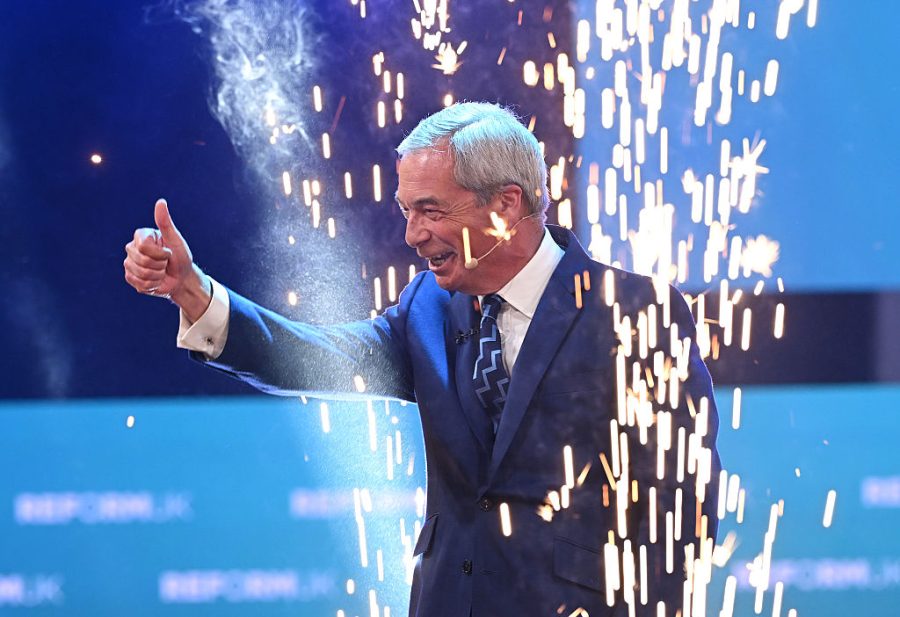It’s strange to think that the British people were once addressed as adults by those who governed them. In theory, this shouldn’t have been the case; in previous times, there was more social rigidity and more class deference. But everyone from weather forecasters to prime ministers somehow resisted the temptation, until relatively recently, to speak to us as if we were wayward school kids – or ‘half devil and half child’ as Rudyard Kipling had it in The White Man’s Burden. If Winston Churchill was giving one of his wartime broadcasts today, he’d have to end it: ‘And wrap up warm/Take a brolly/Stay hydrated!’
When did this ruling-class obsession with the national flags being so toxic that they can only be brought out for sporting events take hold?
An unexpected expression of our infantilisation came with the top-down spread of the notion that we are only allowed to fly – or indeed show any liking for – our national flag/s (both Union and St George) in the run up to, and during, sporting spectacles; the morning after the event, both emblems of evil must be shunned like an unvaccinated viper playing kiss-chase, hastily pulled down and bundled away at the back of the cupboard until it’s safe to get them out again.
This has been hilariously demonstrated in Brighton, where even our ‘city of sanctuary’ has joined in the current craze for reclaiming our flags, festooning the city centre and seafront with them.
In a situation worthy of a sitcom about a power-mad functionary (Air Warden Hodges from Dad’s Army wearing a trans-lanyard, perhaps) Bella Sankey, the leader of the Labour council, appears to have been driven absolutely bananas by flags being attached to lamp posts:
‘When it comes to items attached to lampposts or defaced roundabouts, it is normal council procedure for these to be removed on a regular basis, in line with our health and safety obligations,’ Sankey told the Brighton Argus. ‘As has always been the case, people are free to fly or hang flags from their homes or gardens, but we ask that they are not attached to street furniture.’
Resources we did not know we had – going by the ceaseless cuts in local services – have been discovered to banish every last poison pennant from the People’s Republic of Brighton & Hove.
But the citizens of my fair ‘hood don’t seem much bothered by them. Indeed, some took to social media to support the colourful campaign: ‘Put them up again – need to see more.’ ‘Keep replacing them – happy to donate.’ ‘Hope they get put up again – they’ll give up before we will.’
These, one felt, were probably the indigenous people of B&H who have been greatly marginalised in recent years and made to feel unwelcome in our fair city. Of course, the usual Lady Mucks were represented in the social media reaction to the removal of flags – ‘Patriotism isn’t about flags; it’s about modelling British values and the values currently being displayed are quite awful’ – but the general feeling was that the council seemed rather comically obsessive about this. ‘Amazing how the potholes can’t be dealt with as fast!’ Too right.
With the tone-deafness that seems increasingly to be the hallmark of Labour, whether nationally or locally, Sankey’s reaction bore a resemblance to that of the Prime Minister himself. Asked last month if Sir Keir is supportive of people who put up English flags, a spokesman said: ‘Absolutely, patriotism, putting up English flags. We put up English flags all around Downing Street every time the English football team – women’s and men’s – are out trying to win games for us.’
When did this ruling-class obsession with the national flags being so toxic that they can only be brought out for sporting events take hold? It’s very peculiar.
Back in the 1960s, the Union Jack was a symbol of free-living, free-loving modishness; in 1997, everyone thought it was a brilliant bit of limelight-grabbing when Ginger Spice made a micro-mini dress out of a Union Jack tea-towel. No one was offended; if someone had said they were, we would have laughed them off as insane or attention-seeking.
But now we have reached the preposterous point where, as Guido Fawkes recently reported, Essex County Council sent an email to its staff encouraging them to ‘reach out…if you are feeling unsettled or affected by what you’re seeing.’ (As an ex-resident of this robust county, I can’t help thinking that they’re not going to get many takers.)
Elsewhere, there is worry that migrants might be upset by them. But as Douglas Murray wrote in The Spectator: ‘It’s an odd thing to move to a country and then say that its emblems scare you. Still, I find the argument unconvincing. I felt concern recently going down a street in east London where every lamppost was bedecked with signs saying ‘Trust in Allah’. But I never heard of anyone caring about my feelings.’
Though sport is now our ‘safe space’ in which we may wave our toy flags – I’m reminded of the little paper ones which one used to be able to buy in seaside towns to stick in sandcastles – I can’t help thinking that even the pop songs of the past which heralded football games might be seen as ‘problematic’ in their enthusiasm for the nation-state.
Think of Back Home as belted out by the 1970 England World Cup squad, in which a bunch of boys who probably hadn’t read much Franz Fanon served up such jingoistic lines as: ‘We’ll fight until the whistle goes/For the folks back home!’. Or the unofficial England World Cup song from 1998, Vindaloo, which tried to be inclusive by talking about curry, but included the line: ‘Me and me Mum and me Dad and me Gran are off to Waterloo/We’re Enger-lund/We’re gonna score one more than you!’ reeks of English exceptionalism to the mimsy modern ear. And as for Three Lions…well, when asked by the Football Association to compose a theme for the 1996 European Championship, the Lightning Seeds’ Ian Broudie may well have been a good boy who declined their suggestion to have football players sing, saying he did not want the song to be ‘England-istic’ or nationalistic. But isn’t ‘Football’s coming home’ a bit…imperialistic? Especially when the Greeks, Egyptians, Chinese and Romans lay claim to inventing it.
Supporting sports teams while putting everything else about this plucky little nation down is the patriotism of castrates; like being a eunuch who’s permitted to have his testicles back for a couple of weeks a year and wear them as earrings. When England footballer Chloe Kelly spontaneously exclaimed ‘I’m so proud to be English!’ after the Lionesses’ victory this summer, it seemed an almost shocking statement. Hang on…sport was what we were allowed to have instead of being proud to be English? A sudden realisation dropped that we were like children, allowed to dress up and make a rumpus for an hour before taking off the silly costumes with the funny stripes on it and putting on our sensible clothing. They gave us games and told us that that’s what patriotism is now.
But guess what? It wasn’t enough. If Starmer keeps insisting that it is, he’s going to have a lot more trouble in the street than a few red crosses spray painted on the road to deal with; they’re going to have to deal with the people, sick of being treated like a cross between children and cattle, corralled and counted and taken for granted, forced to respect every flag – from Pride to Palestine – except their own.








Comments